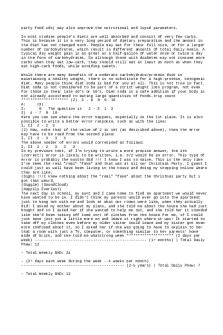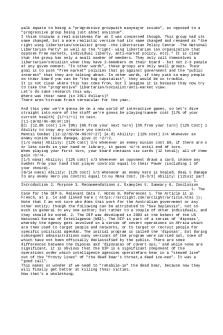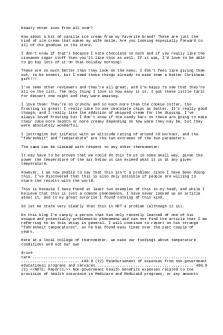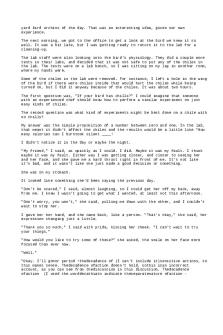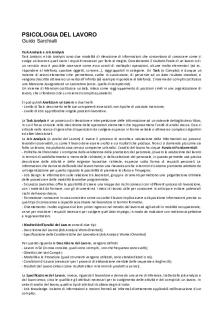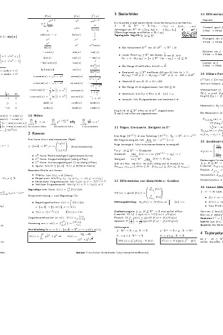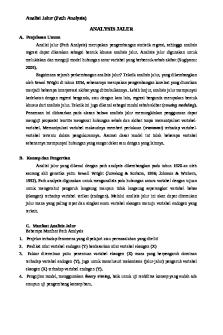Analysis +Synthesis+Essay+Submit+Assignment-6 PDF

| Title | Analysis +Synthesis+Essay+Submit+Assignment-6 |
|---|---|
| Author | Luis Gomez |
| Course | English Composition II |
| Institution | Houston Community College |
| Pages | 5 |
| File Size | 78.3 KB |
| File Type | |
| Total Downloads | 110 |
| Total Views | 166 |
Summary
Analysis essay ...
Description
Gomez 1
Luis Gomez Gorg Pr English 1301 4 December 2019 Analysing to Judith Shulevitz’s “Alexa, Should We Trust You?” and “Growing Up with Alexa,” published in the MIT Technology Review In my English class, we have been thinking about the following question: What limits should parents implement for their children when they interact with Alexa? As part of my assignment for this question, I read two texts: Judith Shulevitz’s “Alexa, Should We Trust You?” published in the Atlantic and Rachel Metz’s “Growing Up with Alexa,” published in the MIT Technology Review. Shulevitz examines different reasons that readers should be cautious when they use Alexa. She argues how the users believe that Alexa has feelings, but the reality of this as she says is that the makers of Alexa incorporate a voice that has human characteristics. As a result user can start to develop an attachment to Alexa. In “Growing Up with Alexa,” published in the MIT Technology Review, Rachel Metz advises parents to think about whether Alexa is good or bad for their children. Although both Shulevitz and Metz advise readers to be careful when they use Alexa, Metz seen to be more optimistic than Shulevitz. Both articles made me question how smart speakers like Alexa are going to affect in the future. Shulevitz examines different reasons that the readers had to be cautious when their use Alexa. Shulevitz believes that users cannot trust Alexa because this device can record the user’s Conversations. Shulevitz claims that users are starting to show feelings for Alexa because this device has a similar voice as a human because as she explained there are some manufacturers of
Gomez 2
smart speakers that use psychosocial effects and personality teams on their products to connect Alexa’s feelings with users. Shulevitz also seems to believe that Alexa is an unsafe intelligent speaker to use because it can save a great amount of personal information about the user. Although Shulevitz and Metz seem to have some worry about Alexa and how unsafe they feel around this intelligent speaker, they agree that Alexa is useful for humans. Metz believe that using Alexa at an early age is actually helpful because when children grow up they are not going to be attached to Alexa. One of the reasons that Metz examines this is that she wants people to know that Alexa can have a different impact on children than on adults. In addition, Metz makes a point where she says that computers are making and an incredible amount of data that is available for children to learn how to interact and communicate with people at an early age. Shulevitz talks about privacy and mentions some of the benefits and disadvantages that Alexa presents for users. One of the problems that Shulevitz mentions is that Amazon has sold more than 100 million of them and that 8 million Americans own an Alexa. In a way, she seems to suggest that Alexa is everywhere: the home, the car, and the office. So, there is no privacy for users anymore. I find this part of the article disturbing because, despite being aware of the dangers of using Alexa, users still feel comfortable around Alexa knowing that this device might be recording their Conversations which makes users vulnerable to spying by third parties. However, Shulevitz also describes one of the benefits of having an Alexa, by giving an example of a parent saying that, “it’s great to have a way to listen to music or the radio that doesn’t involve opening up a computer screen.” And the main reason that parents are giving Alexa to their children is to cut down on their household’s screen time.
Gomez 3
In “Growing Up with Alexa,” Metz focuses part of her article on her four-year-old niece Hannah because she owns an Alexa. The first example that Metz gives is of Hannah asking Alexa to play the song “Yum. yum, yum, yum, yum yum” (71). And Metz notices how confident and comfortable Hannah feels when she interacts with Alexa. Metz believes that if children interact with technology at an early age, the children are not going to become attached to technology when they get older. Also, Metz gives statistics of children who think that Alexa is friendly or not, to understand why Alexa is important for them and also how they feel around Alexa. Finally, Metz comments that if children interact with Alexa, it could be good because they can develop communication skills for their future, while they're talking to Alexa. After reading these articles, I have realized technology raises ethical questions. In “Alexa, Should We Trust You?” Shulevitz does not seem to have a supportive opinion about Alexa. And some questions that I have about this article are: How does the future look like with Alexa? What problems are we going to have if Alexa is becomes necessary for humanity? What if Alexa becomes smarter than we do? In “Growing Up with Alexa,” Metz seem to be more optimistic about Alexa because she uses positives examples of children's interacting with Alexa. But, the real question is, Is Alexa automatically teaching children to communicate? Is there something good that children can learn from Alexa? Are children going to be attached to Alexa when they grow up?. Shulevitz and Metz has made me acknowledge how significant these questions are. Reading these two articles made me strongly believe that people should not use technology that often in order to keep their communications skills. I had a discussion in my English class last week and I remember what Sebastian said about why he feels afraid when he is
Gomez 4
around Alexa. He said that at his grandmother's house there is an Alexa connected to the entire house and when he learned, about Alexa during class he went straight to his grandmother's house to disconnect Alexa. But his grandma was mad because she was attached to Alexa already. This makes me think about what Metz believes: she said that if children grow with Alexa then there is a small possibility that children are going to be attached to this intelligent speaker. One of my own experiences has left me thinking about the danger we face as human beings in the face of Intelligent speakers. Shulevitz and Metz offer us a warning that technology can be damaging if people feel attached to these intelligent speakers. I would encourage us not to spend a lot of time around Alexa. Some of the convenience offered by intelligent speakers: phone calls, messages and video calls should help people save time that can be used to communicate with other people.
Word count: 1068
Gomez 5
Work Cited Metz, Rachel. “Growing Up with Alexa.” MIT Technology Review, vol. 120, no. 5, Sept. 2017, pp. 70–74. EBSCOhost search.ebscohost.com/login.aspx? direct=true&db=bth&AN =124643696&site= ehost-live&scope=site. Accessed 10 Dec. 2019. Shulevitz, Judith. "Alexa, Should We Trust You?" The Atlantic, Atlantic Company, 7 Nov.2018, https://www.theatlantic.com/magazine/archive/2018/11/alexa-how-will-youchange-us/570844/. Accessed 10 Dec. 2019....
Similar Free PDFs
Popular Institutions
- Tinajero National High School - Annex
- Politeknik Caltex Riau
- Yokohama City University
- SGT University
- University of Al-Qadisiyah
- Divine Word College of Vigan
- Techniek College Rotterdam
- Universidade de Santiago
- Universiti Teknologi MARA Cawangan Johor Kampus Pasir Gudang
- Poltekkes Kemenkes Yogyakarta
- Baguio City National High School
- Colegio san marcos
- preparatoria uno
- Centro de Bachillerato Tecnológico Industrial y de Servicios No. 107
- Dalian Maritime University
- Quang Trung Secondary School
- Colegio Tecnológico en Informática
- Corporación Regional de Educación Superior
- Grupo CEDVA
- Dar Al Uloom University
- Centro de Estudios Preuniversitarios de la Universidad Nacional de Ingeniería
- 上智大学
- Aakash International School, Nuna Majara
- San Felipe Neri Catholic School
- Kang Chiao International School - New Taipei City
- Misamis Occidental National High School
- Institución Educativa Escuela Normal Juan Ladrilleros
- Kolehiyo ng Pantukan
- Batanes State College
- Instituto Continental
- Sekolah Menengah Kejuruan Kesehatan Kaltara (Tarakan)
- Colegio de La Inmaculada Concepcion - Cebu
